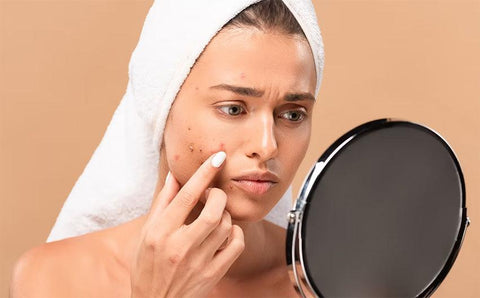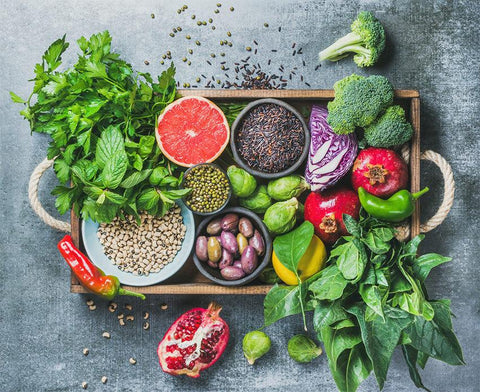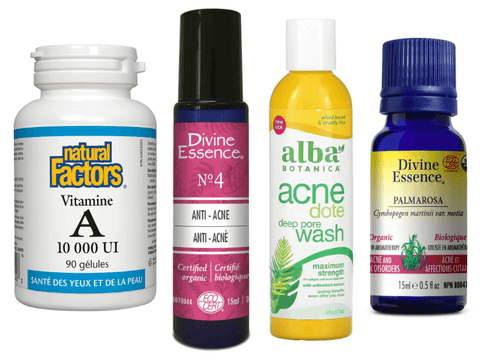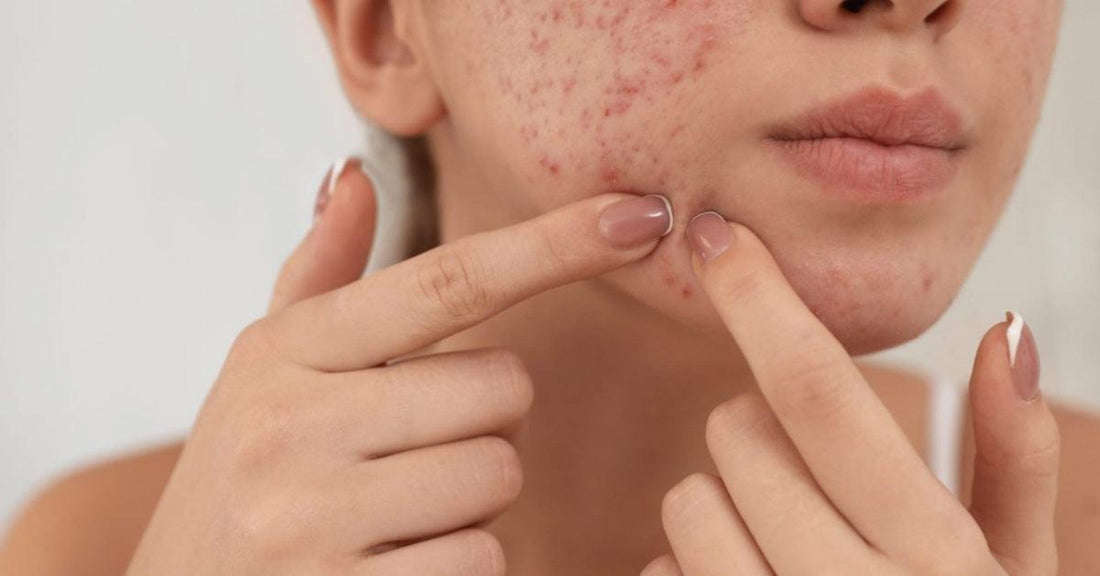Skin problems may seem trivial and superficial, but they're not. If acne, psoriasis or eczema could be treated entirely with simple dermatological creams, not as many people would suffer from them over long periods of time.
While cosmetic skin hygiene is an essential foundation for people prone to acne, it's also important to understand the naturopathic causal approach and address the problem at source.
It's a subject I'm relatively familiar with, having experienced it quite severely as a young adult. My lower face and upper back were covered in red, purulent pimples.
It was when I was finishing my naturopathic studies that I read the famous book Food or the Third Medicine by Dr Jean Seignalet, which finally helped me understand my own story.
In this article, I'll explain the possible causes of acne, the profound link between hormonal, metabolic and digestive health, and the skin. We'll also look at natural remedies to accompany this condition, which more often than not affects the quality of life and self-esteem of sufferers.2, 4
What is acne?
Acne is defined as a benign inflammation of the skin when the ducts of the sebaceous glands fill with sebum, become blocked and become infected with bacteria (most often staphylococcus).1, 2, 4 The result is a comedo or infected micro-cyst, characterized by the familiar pustules.2, 3
The sebaceous gland's sebum production is stimulated by various factors. The main one is a reaction to androgenic hormones, such as testosterone and its metabolites, mainly Dihydrotestosterone (DHT).3, 4 This masculinizing hormone, present in both men and women, can dramatically stimulate the sebaceous glands.2, 3
It is inactive during childhood and begins to be stimulated during adolescence for both sexes. This is why teenage boys and girls are more prone to acne.3 In fact, at least 80% of teenagers suffer from acne at various levels4 and one in 5 suffer from severe or persistent acne.1
Causes of acne

Beyond the causal approach, naturopathy is also an individualized approach. It's about understanding the right cause for the right person.
Acne can be explained by a number of mechanisms, including5 :
- Hormonal imbalance: excess testosterone (DHT) or an imbalance in the estrogen/testosterone ratio increases sebum production by the skin, causing acne..1, 2, 3, 4, 5
- Functional disorders of blood sugar management/insulin resistance (or hyperglycemia) often linked with abdominal overweight; stimulating both androgens and sebaceous glands.5
- intestinal permeability may be maintained by latent or chronic infection or inflammatory diet1 (See diet section for more details).1, 5
- Bacteria on the surface of the skin.1, 3, 4, 5 Usually occurs with all other causes.1 It is the main cause of illness in conventional medicine..5
- Non-optimal liver function (mainly phase 2)5
- Chronic stress (or stress again!), which in turn leads to excessive sebum production.2, 4, 5
Although they all seem very different, the five main causes mentioned are intimately linked, especially when we take a holistic, global approach to health.
Insulin resistance, or poor blood sugar management, is often linked to overweight, both of which adversely affect testosterone metabolites.
A good example here would be polycystic ovary syndrome, an under-diagnosed syndrome in women. It is characterized, among other things, by acne, overweight and signs of masculinization. This still poorly understood syndrome combines insulin resistance and hyperandrogenism.
Chronic stress, fuelled by blood sugar imbalances, can also increase insulin resistance and intestinal porosity!
The liver is never far behind intestinal, hormonal and metabolic (blood sugar) health, since it metabolizes hormones and eliminates them via the intestine, and plays a part in sugar management.
As they say, it's all in the liver!
Treating acne through diet

Optimal macronutrient ratios (proteins, carbohydrates, fats) are essential for better insulin and blood sugar management. In general, the North American diet contains far too many (processed) carbohydrates and not enough protein and healthy fats.
Half of our plate should be vegetables, and no more than a quarter should be starchy foods. The addition of good fats, such as organic first cold-pressed oils, is particularly indicated for stabilizing blood sugar levels and providing satiety. What's more, good fats nourish the skin.
You should have at least 1 g of protein per kilogram of body weight per day, more if you're physically active. Protein should be fairly evenly distributed throughout the day, which means including it in your meals. breakfast.
We always come back to the basics, and we can't stress this enough: more organic vegetables, quality proteins and good fats, and less refined or processed foods.
If you'd like to learn more about nutrition and find your own way to balance, take part in virtual workshops on the subject: http://www.mariefrancetrudelle.com/evenements
The hypotoxic diet
Beyond balancing blood sugar and hormones, if you really want to address leaky gut, Dr. Jean Seignalet's hypotoxic diet has already proved its worth.
Indeed, in his book L’alimentation ou la troisièmedecine, Dr. Seignalet presents 75 pathologies on which the hypotoxic diet has been studied.
In the case of acne, the results are quite impressive. Out of 42 patients, 40 made a complete recovery from inflammatory skin lesions, and the other 2 showed a marked improvement!1
What is the hypotoxic diet?
Dr. Seignalet criticizes the modern diet for not being adapted to our enzymatic system. As a result, we ingest food into our bodies that we are unable to break down. This causes intestinal porosity, leading to various problems. He proposes a return to the ancestral diet that our body is able to recognize.
According to him, the 6 major differences include:
- Consumption of domestic cereals
- Consumption of animal milks and their derivatives (cheeses)
- Cooking of many substances
- Oil refining
- Food pollution
- The risk of vitamin and mineral deficiencies.1
I would add the repeated imbalance in blood sugar levels caused by macronutrient imbalances and refined foods.
The basic principles of the hypotoxic diet
In a few simple words, the hypotoxic diet provides for :
- A raw or gently cooked diet
- Plenty of organic fruit and vegetables
- No processed foods, including refined and hydrogenated oils
- Free from gluten, dairy products, corn and refined sugar
Treating acne with natural supplements and cosmetics

Acne cleansers
An acne cleanser should contain salicylic acid, which is a good anti-inflammatory, antibacterial and sebum-regulating agent.9 We are looking for a percentage of 0.5 to 2% in a cleaning product.9
Palmarosa essential oil
Palmarosa essential oil (Cymbopogon Martini) should be used in 100% of acne cases. Similar to, but superior to, its counterpart the tea treepalmarosa is :
- Powerful broad-spectrum antibacterial (including staphylococcus)
- Sebum balancer
- Skin regenerator
- Balances the skin's bacterial flora2, 6
- Healing!2, 6
***Note that essential oils are very powerful and should be used at a rate of 2% on facial skin. For example, if acne is generalized, 2 parts of essential oil could be added to 98 parts of a cream or natural oil. Jojoba oilwhich is a serum regulator, would be an excellent choice.6
A blend of essential oils
Divine essence offers us a blend of oils, Remedy N.4 Anti-Acnecontaining, among other things, palmarosa, in a super roll-on ball. It can be applied directly to pimples.
Having used it several times, this product is excellent for the most infected pimples.
Carrot essential oil
Another little-known essential oil, carrot oil (Daucus carota ssp sativa) can be used externally on the skin, but is also ideal for internal use.5 as it :
- Is a general tonic for the’body
- Supports digestive and skin mucosa
- Helps the liver eliminate hormones (phase 2)5, 6
To learn more about the use of essential oils, you can take part in a workshop led by our naturopath.
Zinc
Zinc has several important functions in our body, and can give different signs if not optimized. In this case it :
- Supports the regulation of testosterone metabolism5, 7
- Helps insulin function, thus regulating blood sugar levels5, 7
- Supports the formation of connective tissue, i.e., the mucous membranes of the skin and intestines
- It is therefore a remarkable healing agent7
- Supports immune function2, 7
- Acne and difficult healing are among the signs that zinc is not optimal7
Knowing that a man loses around 1.5 mg of zinc per ejaculation, and that use of the contraceptive pill in women reduces zinc levels7 you won't be surprised to hear that many people need zinc!
It's best to take zinc on an empty stomach to maximize absorption, as it competes with several other minerals.
But beware: an overdose of zinc can lead to copper deficiency and other problems.7
Do not take zinc supplements for very long periods (over a year) without the advice of a health professional.
On the other hand, it takes about 4 months to change zinc reserves.9 so be patient.
A hair test done as part of a follow-up with a certified naturopath is an interesting tool for checking your zinc requirements.7, 9
Vitamin A
Vitamin A will be of interest to a person who lives with acne, but who especially has dry skin, as it contributes to the integrity of the mucous membranes and skin by :
- Promoting differentiation of epithelial cells (skin and mucosa)
- Ensuring good production of protective mucus in mucous membranes (digestive and others)
- Dry, easily cracked skin and pimples can occur when the diet is low in vitamin A.2, 7
Therapeutic dosage is around 10,000uL per day. Higher doses may lead to long-term intoxication.7
Olive leaf
- Broad-spectrum anti-bacterial for the intestine5, 10
Olive leaf is gentle enough to be taken over the long term, and is a good choice for anyone diagnosed with a latent or chronic infection in the intestine.
Depending on the case, it could be combined with essential oils taken internally, with the support of a licensed naturopath.
It also has a hypotensive action, and should therefore be avoided in conjunction with medication to reduce blood pressure.10
Fiber
If your diet isn't rich enough in fiber, it's imperative to remedy the situation if you want to get rid of acne.6
These supplements facilitate the integration of soluble fibers. They are also very well tolerated by sensitive individuals:
- FibreSense Relief for IBS and intestinal discomfort from WomenSense
- Reliefibre Intestinal Irritability due to IBS from Natural Factors
Medicinal mushrooms
Medicinal mushrooms such as maitake and reishi could be an interesting choice. In addition to their immune-boosting and cancer-preventing properties, maitake :
- is hypoglycemic5
- Supports liver function10
In addition to its immune and cancer-prevention properties, reishi :
- Helps normalize androgens5
- Supports the liver10
- Anti-inflammatory properties10
In conclusion
As you may have gathered from reading this article, treating acne is not as simple as it seems. It's important to understand the causes, the individuality and the globality of the sufferer.
In addition to diet, skin hygiene and supplementation, already discussed above, don't forget: hydration, stress management, sunlight and exercise are essential for most health/wellness imbalances, including acne.
About the author
Marie-France Trudelle, Certified Naturopath
In-depth knowledge of :
- Nutrition and dietary supplements
- Stress management and sleep
- Physical activity and movement
- Massage therapy
References
- Seignalet, Jean, L’alimentation ou la troisièmedecineÉditions du Rocher, France, 2014, 770 p.
- Holmess Elizabeth, Le traitement naturel, acné, Les éditions modus vivendi, Laval, 2002,165 pages
- Marieb Elaine N. and Hoehn Katja, Human anatomy and physiology, Fourthéditions, éditions du renouveau pédagogique, 2010, p. 181
- Dr Robert Green, Équilibre Hormonales, Les éditions modus vivendi, Montreal, 2006, p. 319 to 330.
- Sala, Laurence, Synthèse thérapeutique sur l'acné, May 2019, 34 pages
- Menga, Nathalie, Aromathérapie, IESN, 2015
- Michel Lecompte, Nutrithérapie orthomoléculaire, IESN, 2017
- https://www.skinceuticals.fr/skin-c-magazine/acide-salicylique-et-acne-quelle-efficacite.html
- Guenette, Lise, Mineralogram, IESN, 2016
- Compendium herbasanté/Alterra, Les importations Herbasanté inc, Montréal 2021










